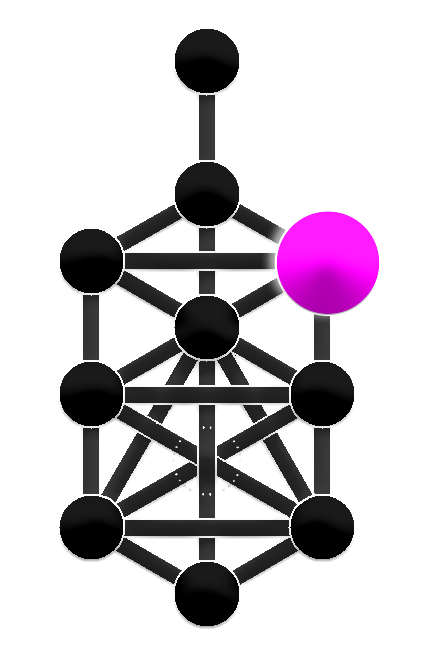Netzach Qlifa | נצח קליפה
The Qlifa in Netzach, is the projection of emotions, of unconscious tendencies that we do not assume in us. For example racism, homophobia..., although from Hod it is justified. When we reject a person a lot, we are projecting something of our own and we must revise it. Until we start to work consciously on it, we do not realize the extent to which our relationship with the environment passes through the mirror of our projections.
We must ask ourselves whether we really see the other or whether we want the other to be a deformed image of ourselves. And the test lies in the degree and quality of our concern for that other. Precisely Netzach's vice and virtue have to do with the way we relate to others. The vice or Qlifa is selfishness (the desire to receive only for oneself in its many manifestations) and the virtue or Mida is the opposite quality, the absence of selfishness.
Netzach has to do with energetic polarity at the emotional level. Its positive qualities are framed in the ethics of concern for others: empathy, sensitivity, tolerance, responsibility (being aware of the effect of our actions on others), solidarity and cooperation. We must also know how to receive in reciprocity. We want relationships that complete us, but at the same time are enriching for both parties.
In a Sephira that vibrates in the ray of nature and art, spiritual experience is defined as the vision of triumphant beauty. The ethics of Truth or the ethics of Good is usually spoken of. Less understood is the profoundly moving and redemptive power of Beauty, which connects us in a direct (emotional, soulful) way with luminous spiritual archetypes.

In a cosmos of beauty and infinite interrelationships everything has the right to express its own nature, its own being. And for this purpose everything has been endowed by Divine Providence with the specific force necessary to reach the realization, the fullness of its being.
Therefore, the seventh word, the commandment is: "Thou shalt not commit adultery". The commandment about adultery has been interpreted exclusively in the sexual realm, but today, with the awakening of ecological thinking on a large scale and the understanding of the consequences of adulterating nature, this commandment has taken on a broader dimension.
Adultery applies to all spheres: For example, at the level of our body, when we introduce harmful substances into it that alter its metabolism and physiology. Thus, addictions such as alcoholism would be a form of adultery. The consequences are physical, psychic, mental and moral degeneration.
And also, of course, at the level of relationships and, in particular, at the level of the couple, a relationship that ideally can involve all levels (physical, emotional, mental and spiritual) and therefore can become the most complete relationship that exists on the human plane. Here we must take into account that each relationship is a world of its own.
For all these reasons, the magical mandate of Netzach is to know, because we have the obligation to know ourselves, to know what our true desires and emotions are beyond the veil of repressions and projections. And the knowledge of our true motivations leads also to the knowledge of those of others: we see their subconscious, why they act, what they really want. We see in ourselves and in others the play of archetypes and of the forces of nature whose mechanism we are also mandated to know. And since knowledge is power, the resulting obligation is responsibility, realizing that everything we do has consequences on others. This applies both at the level of personal life and in the exercise of magic or ritual use of the forces of nature.
Netzach is the emotional field. In Netzach we find what we really feel before passing through Hod, where our emotions are restricted and limited through structured language.
Now, we cannot act all our life anarchically manifesting our emotions without control. In Netzach we ask ourselves: what do I feel? However, when we place emotions on the brain we can become unbalanced. Emotions are positive but, when they lose their channel, they can explode at any time and place, so we can lose our balance.
We can and must show our emotions, but we must think that we do not live alone, that these emotions can affect others, that we must adjust them to the time and place. For this reason, emotions must be channeled by the superior triad, Kether, Chokmah and Binah.
